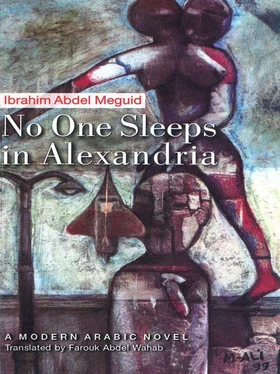Tears poured down her cheeks, and she held Magd al-Din’s hand and kissed it. He let her do it.
As he went out to wash the next morning, Magd al-Din passed Khawaga Dimitri, who was just finishing up, in the hallway.
“Are you going to work today?” asked Magd al-Din. “I don’t think anybody’s going to work today. I’m going to the café, to meet people and find out what’s happened to the city after that raid. Do you want to come with me?’
Magd al-Din went with him. Ever since he had started working for the railroad, he had not once sat in the café in the morning. In the café, Dimitri told him about Karmuz Street and Rhakotis, which Alexander connected with Pharos, now called Bahari. He told him that Rhakotis was a dangerous area, full of drugs and criminals, but that in the past it had been a place where Christians were tortured. He said that Pompey’s Pillar was built on the hill of Bab Sidra, which in Roman times had temples and stadiums where gladiators fought to the death and where lions were set loose upon converts to the new religion. Dimitri told him that it was an old martyrs’ field; that, in honor of the martyrs, the Coptic calendar began the same year that Diocletian massacred hundreds of thousands of Christians; that it had been a bloody area from time immemorial; and that the blood would not be washed away by Pompey’s Pillar, which the Alexandrians had built to immortalize an oppressive ruler.
No one sleeps in heaven
No one sleeps in the world
No one sleeps
No one
No one.
Federico García Lorca
The year was nearing its end. Rain came down on Alexandria in buckets. It seemed that Alexandria was not going to celebrate the new year, that the lights would not be turned off exactly at midnight — they were already off. Nobody was going to throw empty bottles or old pottery and ceramics from the windows to bid the old year farewell and to hope for a better new year. It seemed that neither the Monsignor, Excelsior, and Louvre nightclubs nor casinos like the Shatbi, the Miramar, the Windsor, the Hollywood, the Kit Kat, or any of the others would celebrate the occasion. It was possible that people would spend the last night of the year in the shelters. The previous month, November, had been really bad. Two big air raids in one week, on the eighteenth and the nineteenth at six o’clock and eight o’clock in the evening respectively. Traffic to the railroad station multiplied; caravans of cars, horse-drawn carriages, and old taxis pushed their way through, carrying people and a few belongings. The platforms of the station filled with people waiting, sitting and lying down, filled with patience, fear, and a profound uncertainty. The smell of human sweat mixed with that of fuel oil and the smoke of the trains; the air became heavy, almost palpable. Few trains were moving; most trains had been set aside to move troops and military equipment. At the station you could also see people scurrying around for a reason, or for no reason at all, as well as people screaming because of the crowding or the hardships of life, and people crying from disease, abject poverty, or fear. All these sounds, the voices of males and females, old and young, mixed with those of vendors of pretzels and cheese, peanuts and oranges. Shells and rinds mixed with the broad bean pods and other litter from various food products. Litter filled the corners and fell into the cracks between the tiles, lay on top of the tiles, around those sitting and under the feet of those walking or scurrying, and around those screaming, jesting, or those in a complete daze. Those were the days of the ‘great emigration,’ an unforgettable event in Alexandria that people would later use as a landmark to date events in their lives.
Magd al-Din could see the question in Zahra’s eyes, but he never gave her the chance to ask it. He avoided the fear in her amber-colored eyes, and whenever he turned his face away, she was somewhat relieved. What would really happen if she asked, and he said yes? If she asked to go back, he would go back with her, and the mayor would kill him. He would be leaving war for death. Alexandria was now a safe haven, despite the heavy raids and the long darkness. The desire to leave that was gently waking in her must be suppressed, and she must remain as she had been, a woman who would never leave her husband.
But one night, a particularly cold night at the end of the year, she clung to his chest more than ever before, and he felt her smaller than ever before, despite her rising belly; she was now a child clinging to his chest. She said, having forgotten everything, “I’m afraid, Magd al-Din.”
“Don’t be afraid. The air raids are far away now — most of them are in Dikhayla, the harbor, and the English army camps in the suburbs.”
“I don’t mean the raids. I’m afraid to give birth alone, and I’m afraid to go back to the village.”
“If we must go back, I’ll go with you.”
Zahra was silent.
“Is Sitt Maryam still keeping to herself?”
“Very much so, and she looks worried all the time. The priest is always there, and Camilla is withering away.”
“Keep Sitt Maryam company — don’t let her be by herself. You can make up reasons to go with her to the markets.”
But Zahra, who had been in Alexandria more than a year and now knew how to go to the markets by herself, did not find the prospect of going out to market as appealing as it used to be. Goods were in short supply, and fewer people, vendors or buyers, could be seen in the streets. Only Umm Hamidu relieved her loneliness now. She was still setting up her produce stall at the entrance of the house across the street. Zahra liked to sit with her for a while every time she bought something from her. Umm Hamidu also liked the clever young peasant woman who was always full of questions, so she often asked her to stay, sometimes offering her a small bath stool to sit on. But Zahra sat on the floor most of the time. Umm Hamidu would ask her how her husband Magd al-Din, whom the people of the neighborhood hardly knew, was and why he was always seen in the company of Dimyan, the Christian. Why, really, was he friends with a Christian? Umm Hamidu would ask, then she would remember that Zahra and her husband lived in Khawaga Dimitri’s house and would say “Ah-ha!” Zahra always said, “We were all born after nine months.” Or she said, “The One who created the Muslims also created the Copts,” and Umm Hamidu, seeming to be convinced would say, “You’re right,” but would ask the same questions another day, then would go on and talk about things in Alexandria that Zahra did not know much about. She asked Zahra if she had seen the statue of Muhammad Ali Pasha, and Zahra said she had. So she asked her if she had seen the statue of Ismail Pasha by the sea, or that of Saad Zaghloul at Raml Station, or the English women soldiers, riding colorful bicycles on the corniche or the drunken English soldiers harassing girls on the corniche and in Bahari and Attarin, and sometimes even kidnapping them. She told her amazing stories about families that had lost their fortunes in the Cotton Exchange, about the people of lowly origins who had made great fortunes in no time at all by doing business with the English camps, or those who had won the Muwasa Hospital lottery, which at that time had just been won by one of the notables, a certain Effat, who won a whole ten thousand pounds.
“Ten thousand pounds went to someone who didn’t need it,” Umm Hamidu commented. “And they’re always fancy names— Effat or Hemmat, or Tal’at or Dawlat or Bahgat. Never real Egyptian names like Bahlul or Shahhat, or even Mustafa or Ali. It doesn’t have to be Hamidu.”
She also told her a lot about King Farouk, who loved to pray in the mosque of Mursi Abu al-Abbas during the day, but at night people could hear the dancing and carousing in the gardens of Muntaza Palace all summer long. She told Zahra that if she had seen the Ras al-Tin Palace in Bahari, then the Muntaza Palace was at the other end of Alexandria, on the last, farthest east beach, a palace surrounded by five hundred feddans, which had beautiful trees from all over. She told her that Ismail Pasha, the grandfather of young King Farouk, had built it. “Everything beautiful in Alexandria was built by Ismail Pasha. They say that he was a spendthrift, that he loved life and built the Suez canal so that a queen from France named Eugénie would come and open it. He made the canal so he could see the queen. He was in love with her, and he gave her the canal.” Zahra’s eyes and mouth opened wide when she heard those stories, and Umm Hamidu would continue, “He built the opera in Cairo for her, a big theater so she could hear the singing of Si Abdu and Sitt Almaz. Ismail Pasha was a really generous man.”
Читать дальше












